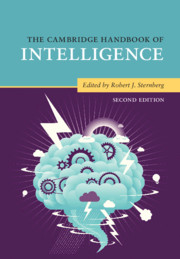Book contents
- The Cambridge Handbook of Intelligence
- The Cambridge Handbook of Intelligence
- Copyright page
- Dedication
- Contents
- Figures
- Tables
- Contributors
- Preface
- Part I Intelligence and Its Measurement
- Part II Development of Intelligence
- Part III Intelligence and Group Differences
- Part IV Biology of Intelligence
- Part V Intelligence and Information Processing
- Part VI Kinds of Intelligence
- Part VII Intelligence and Its Role in Society
- Part VIII Intelligence and Allied Constructs
- 42 Intelligence and Personality
- 43 Intelligence and Achievement
- 44 Intelligence and Motivation
- 45 Intelligence and Creativity
- 46 Intelligence and Rationality
- 47 Intelligence and Wisdom
- 48 Intelligence and Expertise
- Part IX Folk Conceptions of Intelligence
- Part X Conclusion
- Author Index
- Subject Index
- References
46 - Intelligence and Rationality
from Part VIII - Intelligence and Allied Constructs
Published online by Cambridge University Press: 13 December 2019
- The Cambridge Handbook of Intelligence
- The Cambridge Handbook of Intelligence
- Copyright page
- Dedication
- Contents
- Figures
- Tables
- Contributors
- Preface
- Part I Intelligence and Its Measurement
- Part II Development of Intelligence
- Part III Intelligence and Group Differences
- Part IV Biology of Intelligence
- Part V Intelligence and Information Processing
- Part VI Kinds of Intelligence
- Part VII Intelligence and Its Role in Society
- Part VIII Intelligence and Allied Constructs
- 42 Intelligence and Personality
- 43 Intelligence and Achievement
- 44 Intelligence and Motivation
- 45 Intelligence and Creativity
- 46 Intelligence and Rationality
- 47 Intelligence and Wisdom
- 48 Intelligence and Expertise
- Part IX Folk Conceptions of Intelligence
- Part X Conclusion
- Author Index
- Subject Index
- References
Summary
There are individual differences in rational thinking that are less than perfectly correlated with individual differences in intelligence because intelligence and rationality occupy different conceptual locations in models of cognition. A tripartite extension of currently popular dual-process theories is presented in this chapter that illustrates how intelligence and rationality are theoretically separate concepts. Thus, individual differences in the cognitive skills that underlie rational thinking must be studied in their own right because intelligence tests do not explicitly assess rational thinking. We close the chapter by describing our attempt to develop the first prototype of a comprehensive test of rational thought, the Comprehensive Assessment of Rational Thinking (CART). With the CART, we aim to draw more attention to the skills of rational thought by measuring them systematically and by examining the correlates of individual differences in these cognitive skills.
Keywords
- Type
- Chapter
- Information
- The Cambridge Handbook of Intelligence , pp. 1106 - 1139Publisher: Cambridge University PressPrint publication year: 2020
References
- 1
- Cited by

